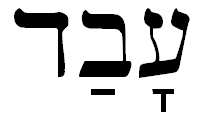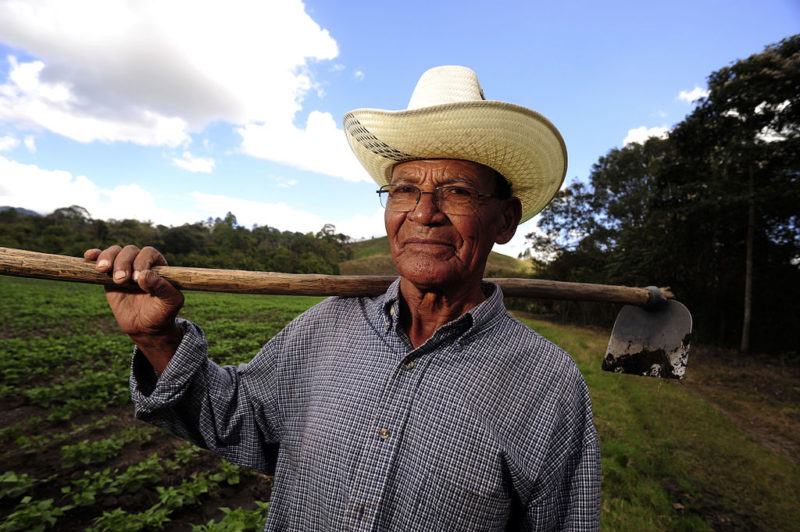Is there a relationship between work and worship? And if so, what is that relationship?
Your answer depends on your worldview. Most Christians, functioning from a Greek mind, would say there is no relationship. Worship is sacred and labor is secular. Moderns would say that there is no worship, just work. Many Animists would see labor as a curse from the gods, and worship is something you do to minimize that curse.
In contrast, one Hebrew word shows us the radical relationship between work and worship: that word is ָבַד – avodah (pronounced ah-vo-DAH).
 Many people long for their work to have significance. Christians often think that for your work to be meaningful, it must be “spiritual”: evangelism, missions, church planting or pastoring.
Many people long for their work to have significance. Christians often think that for your work to be meaningful, it must be “spiritual”: evangelism, missions, church planting or pastoring.
Many careerists spend long hours in a job that may not seem significant, but the reward is money and power. People choose careers based on how much money they can make or how much power they can hold over others. Yet their lives often lack significance.
It is good that many millennials are looking for something more, for impactful lives and meaningful employment. The key to this quest is found in an ancient path: avodah.
The Hebrew word that captures worship and work
Avodah is used 289 times in the Old Testament and is translated variously as “worship,” serve” and “work.”
In some verses, avodah means work, as in to cultivate the field or do common labor:
- Genesis 2:5 – “and there was no man to work (avodah) the ground.”
- Genesis 2:15 – “The LORD God took the man and put him in the garden of Eden to work (avodah) it and keep it.”
- Exodus 34:21 – God, in renewing the covenant with Moses, says, “Six days you shall work (avodah),”
In other verses, avodah means worship, as in worshiping the Lord.
- Exodus 8:1 – “This is what the LORD says: ‘Let my people go, so that they may worship (avodah) me.’”
- Exodus 12:31 – “Then he summoned Moses and Aaron by night and said, ‘Up, go out from among my people, both you and the people of Israel; and go, serve (avodah) the Lord …’ ”
- Joshua 24:15 – “And if it is evil in your eyes to serve the Lord, choose this day whom you will serve, whether the gods your fathers served in the region beyond the River, or the gods of the Amorites in whose land you dwell. But as for me and my house, we will serve (avodah) the Lord.”

Here is the entry from a noted Hebrew lexicon:
עָבַד (ʿā·ḇǎḏ): v.; … work, labor, do, i.e., expend considerable energy and intensity in a task or function … give considerable energy and intensity to give aid to another (Lev 25:46; 2Sa 16:19); … worship, serve, minister, work in ministry, i.e., give energy and devotion to God or a god, including ceremonies (Ex 23:24, 25); cultivate, plow, i.e., work soil (with or without an animal) as part of the agricultural process (Ge 4:2; Isa 30:24); plowed, be cultivated (Dt 21:4; Ecc 5:8; Eze 36:9, 34)[1]
Take note of the diverse spectrum of meaning of avodah as highlighted.
Work and worship are God’s purposes for humans
Avodah reveals that the nature of the Hebrew mind is wholistic, integrative and comprehensive. There is no sacred-secular dichotomy SSD here. The word used for working in our calling is the same word used for worshipping the Lord. In fact, God put us on earth to worship-work. In fulfilling the First Commission (Genesis 1:26-28) – the Cultural Mandate, we work (avodah) and at the same time we worship (avodah) the living God.
Avodah reveals that our labor can be a form of worship. Historian Thomas Carlyle puts it simply: “Laborare est Orare, Work is worship … All true Work is sacred; in all true Work, were it but hand-labour, there is something of divines … No man has work, or can work, except religiously ….”
The Avodah Institute makes the point:
What a powerful image to think that the word for working in the fields is the same that was used for worshipping the God of Abraham, Isaac and Jacob.
The Israelites understood that work could be a way to honor God and neighbor, to serve God and neighbor, and yes, to worship God and serve neighbor.
Avodah provides the framework for a theology of work. It leads to an integrated mind and life. Like the scriptures themselves, there is no divided, Greek mind of sacred/secular dichotomy. Avodah is the integrated action of worship and labor. The Cultural Mandate is to cultivate: to sacredly work.
 For the Hebrew mind, unlike the Greek, there is no separation of labor from worship. Worship is not only for Sunday, but for Monday as well. Worship is not limited to a religious meeting in a building or for a public evangelistic effort. Worship is to take place in the midst of our everyday lives, in our homes, in the office, in the factory. The God of the Bible is not a part-time God. Our worship should not be thought of as part-time praise.
For the Hebrew mind, unlike the Greek, there is no separation of labor from worship. Worship is not only for Sunday, but for Monday as well. Worship is not limited to a religious meeting in a building or for a public evangelistic effort. Worship is to take place in the midst of our everyday lives, in our homes, in the office, in the factory. The God of the Bible is not a part-time God. Our worship should not be thought of as part-time praise.
The comprehensive Hebrew mind
For the Hebrew mind, the idea of worshiping for a couple of hours on Sunday and then functioning secularly the rest of the week, would be nonsense. Worship was a continuous act. Worship and work were seamless.
Two examples of the worship-work divide might be helpful. A mission organization I am familiar with offers training to their staff. Their classes in praise and worship are always packed because they see worship as a sacred activity. Unfortunately their classes in art, community development, and humanities languish because they are perceived as “secular” activities.
Christian relief and development organizations may be motivated by Christ to do their “secular” work of helping the poor. These good people go to church on Sunday, but on Monday show up to work in the development industry functioning from secular premises.
Too many churches are program based. Thinking it is more spiritual to be in a church building, they have programs every day of the week to attract people to their buildings. The more often you show up “at church” the more spiritual you are perceived to be.
Very few cultures understand this principle. Very few Christians understand it. We must have minds shaped by avodah.
My dear friend Christian Overman states that:
Work, at its core, is an act of governance. Governance over wood, metal, cows, cotton, and carrots. Governance over sound waves, electrical currents, and wind. Governance over computer keyboards, fiber optics, and digital images. Governance over people. Governance over things. Governance over ideas.
Work, and worship, are about governance
We could also say that worship, at its core, is an act of governance. This is the theme of the book of Proverbs. This is the theme of the book of Proverbs. This is a very practical book for translating our worship into how to live and how to labor in a way that leads to sanctification, which leads to life. It is a book about governance on two levels, first is the level of personal self-government; second is the level at which kings and presidents are to govern nations.
God placed us here to glorify him by governing in His stead. To that end, we are to labor, serve and worship seamlessly – avodah!
To read more on this subject pick up my book LifeWork: A Biblical Theology for What You Do Every Day.
- Darrow Miller
[1] Swanson, J. (1997). Dictionary of Biblical Languages with Semantic Domains : Hebrew (Old Testament) (electronic ed.). Oak Harbor: Logos Research Systems, Inc.







2 Comments
Joe
July 25, 2018 - 3:55 pmHave been waiting for years for someone of influence to explain this in context of the whole Bible. An in depth look at Romans 12;1-3 shows that working-serving-worshiping as a living sacrifice is our spiritual act of worship, not to the World but to GOD. A recent survey of our Ministry’s major donors revealed that they work an average of 54 hours a week. They give 10s of thousands of dollars every year to various ministries ( most likely more than I know) This makes each hour they work a spiritual act. Furthermore, they are giving away more than money, they are giving away the hours of their lives it took to earn that money for God’s purpose.
admin
July 26, 2018 - 3:00 pmHello Joe
Thanks for your comments. Let me say that the Hebrew word avodah, promotes the concept of “working sacredly” – all moral work is sacred, not simply doing “sacred work” – i.e. spiritual work or ministry.
You write that because donors give money they make working to charity, “this makes each hour they work a spiritual act.” I would disagree with this assessment. Their work does not become a spiritual act because they give some of what they earn to ministry. There is no distinction between sacred work and secular work. We are to work-sacredly; this is avodah.
For more on this please see our free online video series Monday Church: http://coramdeo.com/courses/MondayChurch or read my book LifeWork: A Biblical Theology For What You Do Every Day.